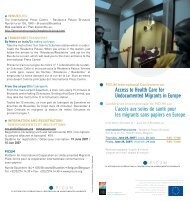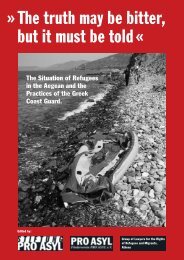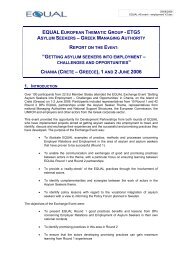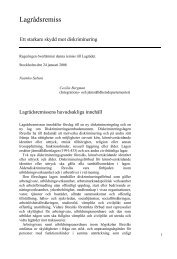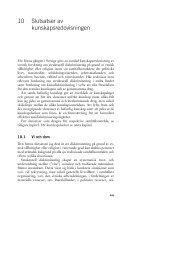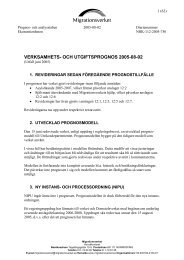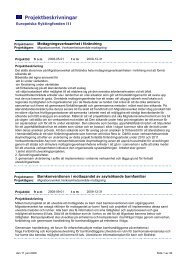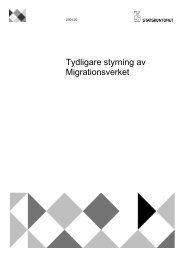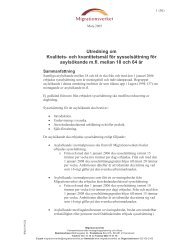A Handbook for Asylum seekers in sweden - Tema asyl & integration
A Handbook for Asylum seekers in sweden - Tema asyl & integration
A Handbook for Asylum seekers in sweden - Tema asyl & integration
Create successful ePaper yourself
Turn your PDF publications into a flip-book with our unique Google optimized e-Paper software.
Red Cross Office, FARR and Caritas are all competent bodies that can give youthe necessary legal advice and assistance <strong>in</strong> this regard. You can f<strong>in</strong>d their contactdetails at the end of this handbook. Here it is important to remember that anyapplication/appeal you <strong>in</strong>tend to send to the concerned authorities should bestbe done through a competent lawyer, but <strong>in</strong> emergencies other persons can alsoact on your behalf.When does an <strong>asyl</strong>um seeker become ‘illegal’ and what does it meanto rema<strong>in</strong> <strong>in</strong> the country illegally?When an <strong>asyl</strong>um application is exam<strong>in</strong>ed and reasons to grant residence permitwere not found then the person is ordered to leave the country. If the person doesnot leave the country and cont<strong>in</strong>ues to live <strong>in</strong> Sweden his/her stay <strong>in</strong> the countrybecomes illegal. This means that the person does not have any status, lacks rightsand access to social services.What is detention and who is deta<strong>in</strong>ed (förvar)?Detention is a special centre where <strong>asyl</strong>um <strong>seekers</strong> (and other aliens) may bedeta<strong>in</strong>ed. There are three grounds <strong>for</strong> detention:• If the identity of a person is unclear.• If it is necessary to enable an <strong>in</strong>vestigation on the right of a person to rema<strong>in</strong><strong>in</strong> Sweden. This is generally when there are questionable aspects to the person’sidentity and further <strong>in</strong>vestigation is needed, particularly if there is a possibilityof national security be<strong>in</strong>g at risk if they are released. Identity <strong>in</strong>vestigationsare undertaken by the Migration Board’s <strong>Asylum</strong> Bureau with aid from theForeign Affairs Department and the Police.• When a person, <strong>in</strong> all probability, will soon be deported or if it is expectedthat they will go <strong>in</strong>to hid<strong>in</strong>g if released. In this case, detention cont<strong>in</strong>ues untiltravel documents are prepared.A person should not be held <strong>in</strong> detention <strong>for</strong> more than two weeks, unless thereare exceptional grounds <strong>for</strong> a longer period. If, however, a refusal-of entry or expulsionorder has been issued, the person may be deta<strong>in</strong>ed <strong>for</strong> not more than twomonths unless there are exceptional grounds <strong>for</strong> a longer period. Under Swedishlaw, no child under 18 years shall be held <strong>in</strong> detention <strong>for</strong> more than 3 days. Inextreme circumstances this can be extended to 6 days. Which authority it is thatdecides whether to take someone <strong>in</strong>to detention depends on where the <strong>asyl</strong>umapplication is <strong>in</strong> the <strong>asyl</strong>um process.After three days <strong>in</strong> detention the <strong>in</strong>dividual has the right to have legal assistance.It is important that all deta<strong>in</strong>ees are aware of their rights <strong>in</strong> detention22 | <strong>Asylum</strong> RECEPTION <strong>in</strong> FOCUS




